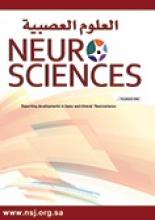Abstract
OBJECTIVE: To investigate the prevalence of post stroke depression and its association with hospital admission conditions.
METHODS: In this case-control study, 120 patients with ischemic cerebral stroke from Aliebne-Abitaleb Hospital, Rafsanjan, Iran, during 2004-2006 were evaluated. Sixty patients were hospitalized near very ill patients (including patients with delirium, decreased consciousness, stupor, coma, sphincteric disorders, ingestion disorder with nasogastric tube insertion, and deceased patients) (cases), and 60 were admitted not adjacent to ill patients (controls). All patients were matched for stroke risk factors and location and size of lesion, and all were admitted to hospital for at least one week. Depression was assessed on admission and after one week according to the Beck inventory questionnaire. The results were analyzed using Fisher’s exact test.
RESULTS: The mean age of the patients was 63±4 years, and 65% were female. The depression rate in all patients adjacent to ill patients significantly increased by the seventh day of admission compared with the control group (p<0.001). On analysis according gender, this increase was significant only in women (p<0.001).
CONCLUSION: Hospitalization of stroke patients without considering separation according to clinical condition, increases the depression rate in these patients.
- Copyright: © Neurosciences
Neurosciences is an Open Access journal and articles published are distributed under the terms of the Creative Commons Attribution-NonCommercial License (CC BY-NC). Readers may copy, distribute, and display the work for non-commercial purposes with the proper citation of the original work.






